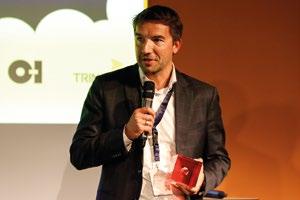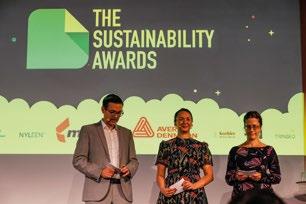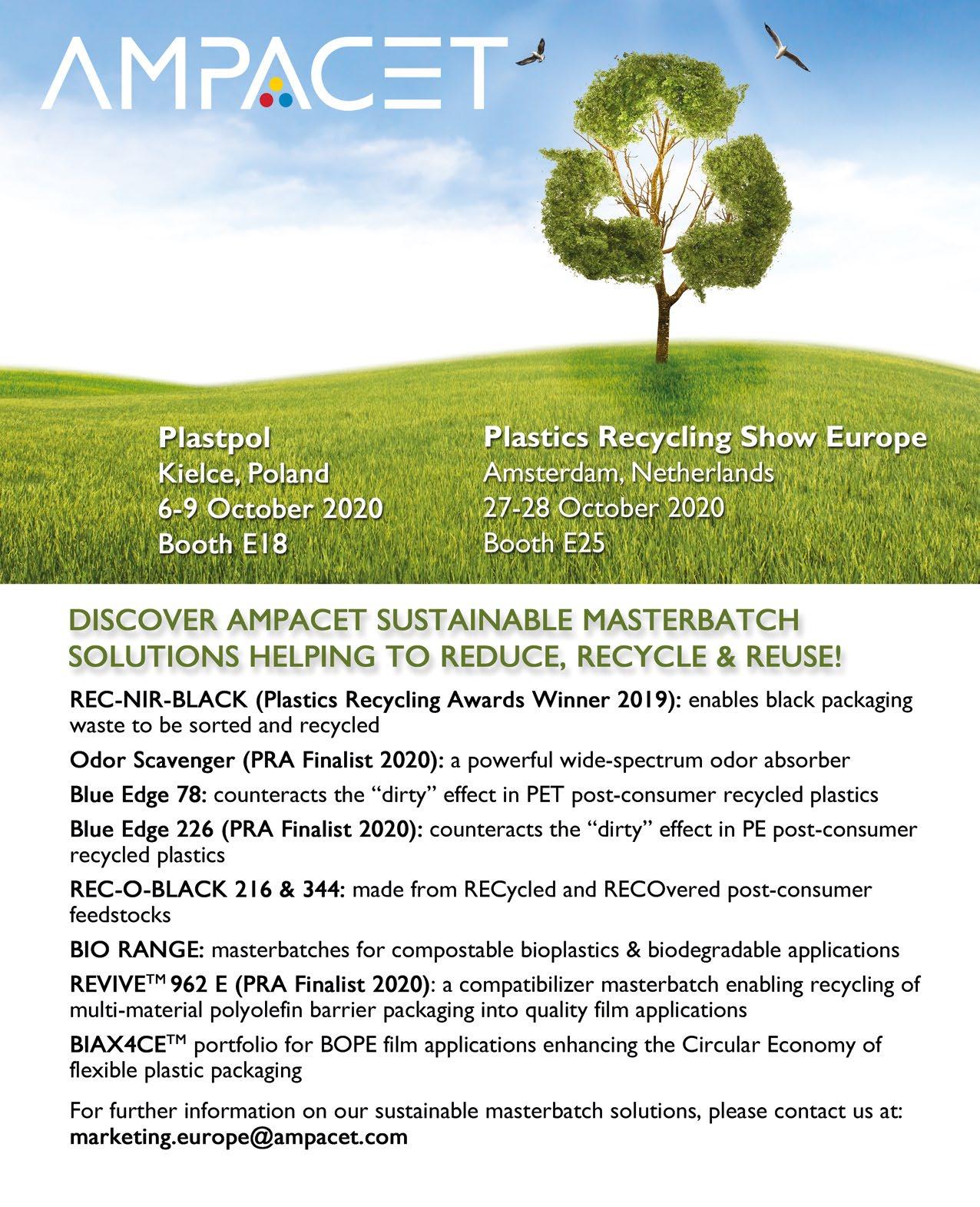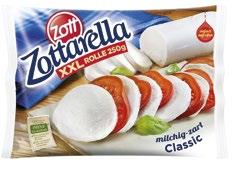
7 minute read
TAKING THE PULSE OF SUSTAINABILITY
TAKING THE PULSE OF SUSTAINABILITY
The most important global competition focusing on sustainable packaging innovation is back! The Sustainability Awards 2020 attracted a record-breaking 275 submissions, up nearly 50% on last year’s record and representing every continent across the globe. Tim Sykes reports.

Ariel liquid detergents bottles with 50% rHDPE (P&G, Belgium)
P&G entered into a partnership with an energy recovery company to recycle and reprocess HDPE for re-use in Ariel laundry detergent bottles. This realizes the commitment to reach 50% recycled content in its liquid bottles as of 2020.
High opacity & premium whiteness PET with 0% TiO2 content (PENN COLOR, Netherlands)
Concentration of TiO2 (used in masterbatches to provide opacity) in the non-clear recycled PET stream causes processing issues. This innovative masterbatch technology for PET bottles eliminates TiO2, achieving levels of opacity and whiteness that would typically require around 8% TiO2 with conventional technology.
MIWA reusable packaging system (MIWA Technologies, Czech Republic)
An innovation leveraging smart technology and electronic dispensers to simplify the shopping experience and compete with single use packaging. Thanks to data-driven operational efficiency, the system enables packaging-free sales in high hygienic standards for brand owners and retailers. Y ou’ll have to wait until October to find out this year’s Sustainability Awards winners, revealed during the Sustainable Packaging Summit – a series of high-level virtual events, rather than the originally planned physical one in Lisbon (for obvious reasons).
However, in the meantime, we can introduce you to the finalists in each category. The 39-strong international, expert jury has completed round one of judging, and have selected the following submissions across the
‘Driving the Circular Economy’
seven categories:
SUSTAINABILITY AWARDS PLATINUM SPONSORS Blue Tube Evo Lightweight 100% recycled aluminium tube (TUBEX Aluminium Tubes, Austria)
The Blue Tube Evo lightweight is the world’s first 100% recycled aluminium tube, with 95% post-consumer and 5% post-industrial recycled aluminium. Thanks to a specially developed alloy, up to 15% of material can be saved.
GOLD SPONSOR MIWA reusable packaging system

SUPPORTING PARTNERS
‘Recyclable Packaging’ BericapValve silicon-free valve (Bericap Holding, Germany)
A TPE, silicon-free valve which floats in water, enabling perfect separation and preventing contamination in the recycling process.
Matrix paraffin-free paper-based packaging Push Tab loop recyclable unit dose pharma packaging (Huhtamaki, Germany)
Huhtamaki presents the market’s first ever recyclable unit dose packaging for pharmaceutical solid products called Push Tab ® , which adds a push-through function to strip packaging, creating an alternative for blister packaging.
Ultra-high barrier sandwich film (Max Speciality Films, India)
BOPP film alternative to aluminium and PE, recyclable in polyolefin recycling streams.
KORORCY PE stand-up pouch
(Korozo Flexibles, Turkey)
(Amcor, France)
Technology enabling a breathable PE layer, composed of molecule chains bound together in a three-dimensional matrix, replacing multi-layer unrecyclable substrates for soft cheese packaging.

Push Tab loop recyclable unit dose pharma packaging
‘Second skin’ paper champagne case

‘Resource Efficiency’ Eco PBL 240/9 tube (Huhtamaki, Germany)
This tube reduces plastic material by 20% while increasing recyclability by reducing EVOH by 40% to below the 5% limit on foreign material.
High-barrier mono-PE stand-up pouch.
from recycled paperboard (Frugalpac, UK)
The world’s first coffee cup made from recycled paperboard, with a PE liner which is separable in the recycling process.
‘Second skin’ paper champagne case (Maison Ruinart, Pusterla 1880, and James Cropper, France)
A mono-material gift-box packaging which is recyclable in the paper waste stream. The case is nine times lighter than the current Ruinart box and reduces the carbon footprint by 60%.
Frugal Cup coffee cup made
Volvic 8L 100% rPET bottle (Danone, France)
The key innovation of this eight-litre bottle is that it is the brand’s first product made from 100% recycled PET. It also reduces carbon footprints by 45% compared with the previous format.

‘Best Practice’ EasyD4R ® software tool for evaluating recyclability
(Henkel, Germany) This comprehensive tool is used across Henkel, enabling packaging developers to evaluate plastic, paper, glass, aluminium and tinplate packaging and identify possible areas for improvements. To accelerate transition to a circular economy, Henkel has made the tool publicly available.
Ecover laundry bottle (People Against Dirty, Belgium)
100% PCR bottle promoted for reuse as well as recycling, saving 56 tonnes of plastic and 318 tonnes CO2 per year based on current sales volumes.
GaBi Packaging Calculator Plus (Sphera, Germany)
A web-based LCA calculator designed for the requirements of the packaging industry, helping evaluate environmental impacts and recyclability of packaging and identify hot spots and optimization potential.
Loop reuse platform (TerraCycle, USA)
Now launched in Europe and North America, Loop is the first ever international shopping platform that partners with brands and retailers to re-imagine household goods to be packaged in durable and reusable containers.

Loop reuse platform
‘Machinery’ Boomerang Horizontal Stability Tester (Safe Load Testing Technologies, Spain)
An advanced solution for packaging optimization to substantially reduce the use of plastics in packaging while also increasing safety along the distribution cycle.
PaperForming Technology (Syntegon, Germany)
A packaging system developed by Syntegon Technology in partnership with BillerudKorsnäs to produce shaped paper pods that replace plastic blisters. These can be customized in terms of design, functionality and barrier properties.
Non-impact digital finishing technology (Highcon, Israel)
A laser cutting system featuring a technique for physical creasing via 3D printed rules. Creasing via these rules and laser cutting are all performed on one single platform, thus eliminating the need for a die cutting form that is used in the current analogue processes. This reduces carbon footprint by eliminating components needed to produce the die as well as transportation and storage.
Slimbox - perfectly fitted packaging (Fit Things, Belgium)
A small machine that cuts perfectly fitted e-commerce packaging out of flat sheets of corrugated cardboard.
PaperForming Technology


Forest Film

‘Bio-Based Packaging’
A new category introduced for the 2020 edition, scouting for the best ideas and innovations not yet on the marketplace.
Closing the Glass Recycling Loop method (Ardagh Group, UK)
A method to produce briquettes from the fine particle glass (<4mm) rejected during the glass recycling process in order to achieve 100% recyclability of collected glass containers.
COLOR-IN / COLOR-OUT (Smart Coloring, FuturePackLab, and POPULAR PACKAGING, Germany)
A process to decolour plastics without harmful chemicals. This technology is the sustainable answer to keeping the plastic streams clean, closing the plastic and the colour loop, saving resources and 50-60% of greenhouse gas emissions.
Fully recyclable plastic aerosol container (P&G, USA)
This aerosol, the culmination of five years’ R&D, combines a PET dip-tube and polymer valve, eliminating the metal valve which is judged detrimental on a polymer bottles by most recyclers.
Watch out for in-depth profiles of each of the finalists over the coming weeks on PackagingEurope.com and subscribe to our newsletter or YouTube channel for details of the Sustainable Packaging Summit, for sustainability discussion, announcements, networking and the announcement of this year’s Sustainability Awards winners. n
ARES (ATG DIRECT INC, Canada)
Polyamide adhesives made from post-consumer and post-industrial chemicals – primarily from soybean oil via waste/by-product streams, as an alternative to polyamide derived from pine-based sources.
bioORMOCER ® functional barrier coatings (Fraunhofer Institute for Silicate Research, Germany)
Recyclable and biodegradable mono coatings offering barrier protection on plastic and paper substrates comparable to modern multi-layer packaging.
monta biopack ® bio-based adhesive tape (monta Klebebandwerk, Germany)
A self-adhesive tape using a PLA carrier and monta’s natural rubber adhesive.
Forest Film (UPM Raflatac, Finland)
The first polypropylene film label material produced from UPM BioVerno™ naphtha – a product innovation originating from sustainably managed forests
and pulp production residue.
100% chemically recycled packaging material (BASF, Germany)
BASF and partners have developed a prototype packaging consisting of polyamide and polyethylene made from 100% chemically recycled material. The materials were manufactured with pyrolysis oil derived from mixed plastic waste, within the scope of the ChemCyclingTM project.
Sustainable aerosol foam dispenser (Triple Line Technology, UK)
A proprietary flow-path technology that can be incorporated into the valvedip tube components or actuator of standard aerosol packaging, allowing high quality micro-foams (bubbles < 100microns) to be dispensed using compressed gas propellants.

100% chemically recycled
packaging material
Note we have five finalists in the categories ‘Recyclable Packaging and ‘PreCommercialized Innovation’ rather than the usual four because in both cases two submissions in fourth place attained exactly the same total score.








